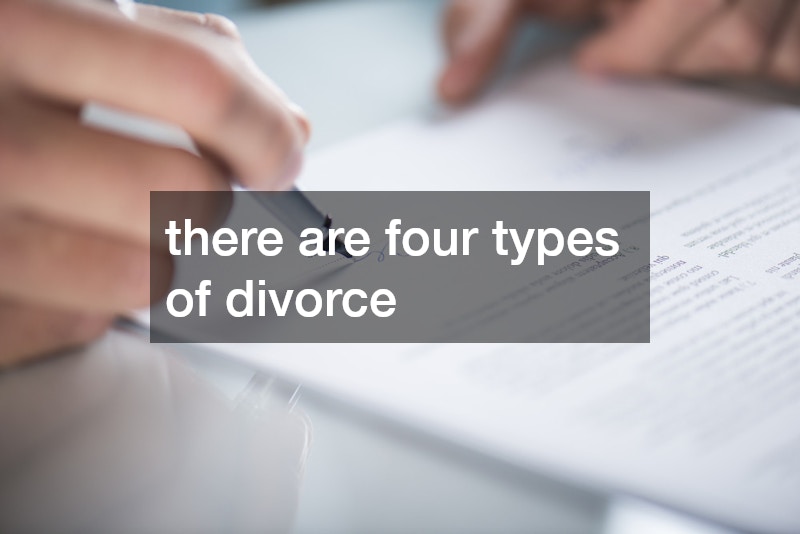
When a couple is involved in a divorce, the issues involved in the divorce can become emotionally challenging. According to U.S. Law Dictionary, there are four types of divorce. Types of divorce include uncontested cases, which don’t require a trial. A contested divorce is one where the ex-spouses can’t agree on the terms, and the case requires a trial. At times, one spouse will file for divorce and receive no response from the other spouse; this is termed a default divorce (a one-sided divorce.)

According to Legal Zoom, the fastest way to get a divorce is typically a no-fault, uncontested divorce. You may wonder, “Do both parties need to agree to divorce?” According to Divorce Net, the answer is no. A contested divorce may take longer to resolve and may involve lengthy negotiations or require arbitration, but it can be finalized in time.
Some couples find that they agree on the major issues of the divorce. These uncontested divorces are also known as collaborative divorce. These divorces will still require the same types of paperwork for the court but won’t necessitate a trial. Clients in collaborative divorces don’t require a lawyer, but some find a lawyer reassuring.
When you and your spouse decide to get a divorce, it can be overwhelming. You, your spouse, and your children will all have to adjust. No matter whether you decide to divorce after 3 years or divorce after 5 years – (or any other length of time), it’s likely to feel as though nothing makes sense. One of the first things to do is to contact a family law attorney.
Make a Separation Agreement

Once you decide to divorce, you should ask your lawyer to draft a separation agreement. Don’t believe everything you read online or hear about separation. If you hear conflicting statements about separation, ask your attorney, “Which of the following statements is true of a separation?” They’ll help you to learn the truth.
Find a Divorce Attorney Near You
You may wonder, “Where is a divorce center near me?” An online search will likely give you a list of several attorneys you can call. At your first appointment, the divorce attorney will ask you questions to determine the grounds for the divorce, as the court requires. They can work with you and explain how the laws of your state will affect the timing of the divorce.

In the United States, there are two divorces each minute, a staggering amount that essentially guarantees that everyone knows someone that has gone through the process. However, the rather sensitive nature of this topic prevents friends and acquaintances from questioning a person about the process, leaving many essentially clueless about what to expect when they are facing this life changing event. Nothing is more terrifying to most people than the unknown, and frightened people are more inclined to act badly and hurt those around them. Hopefully, before behaving badly, some will read this or another explanation of what to expect when filing for divorce.
Filing and Temporary Orders
Every divorce involves so many variables that no two are exactly the same, but that fact not withstanding, every divorce must begin with the initial filing of a petition for divorce. When this first step is taken by only one person, either in secret or against the wishes of their spouse, it is a contested divorce, or most likely will be once the other person hears of it. Alternately, filing uncontested divorce papers means both parties are consenting to the dissolution of their marriage, no matter how unhappily. In either circumstance, one or both spouses might need to seek temporary orders regarding financial support or child custody as well.
Service and Response
This process usually goes smoothly when filing uncontested divorce papers. Unfortunately, contested divorce forms are often more dramatically served, often at places of employment. This simply causes more negativity. It is advisable to have both contested or uncontested divorce forms served in a place that will not involve onlookers. In an uncontested situation, allow the spouse time to choose a divorce lawyer and send the papers straight to the attorney. Once papers have been served, the other spouse must file their response with the court.
Working Toward Dissolution
The end of the divorce process is called the dissolution of marriage, but it often does not occur easily. Negotiation must occur first, an often cantankerous process in which all mutual property and assets must be divided, as well as any child custody issues. If this cannot be managed without the court?s involvement, a trial will occur in which the decisions will be out of the former couple?s hands. Only then can the marriage end.
Clearly, filing uncontested divorce papers is the ideal method of ending a marriage, but that often is not possible. In either case, it is often advisable to seek out divorce help with a qualified attorney. They can answer any questions remaining and help plan out next steps required in the process. Make a call and talk to one of these attorneys to help put this matter to rest as quickly as possible.
